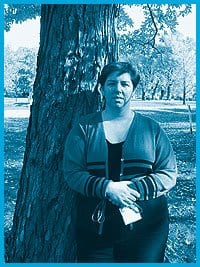A University of Ottawa student is looking for hard evidence that marriage is a good thing for same-sex couples.
Since June, marriage has been a legal option for same-sex couples in Ontario. Heather MacIntosh, a doctoral student in clinical psychology at U of O, is asking just how this option is going to affect gay and lesbian couples.
Her study will look at couples who have chosen to marry, and those who haven’t, in order to determine how relationships will change over time and the effect the legalization of same-sex marriage will have on relationships.
“I’m expecting to find that couples who choose to get married are doing it for very particular reasons,” MacIntosh explains. “And that through that choice their relationship-closeness is enhanced, their own sense of their identity as a gay or lesbian person is enhanced, their connection with their community is enhanced and their well-being, in fact, is better.”
MacIntosh admits there’s an element of advocacy driving the research.
“One of the major reasons for doing this, of course, is a political one,” she explains. “When I looked at the literature in the countries where same-sex marriages are legal they haven’t done any research.”
The absence of that research suggests to MacIntosh a missing element in the argument for same-sex marriages. Assuming that her hypothesis is borne out, homosexuals could point to research like hers and argue marriage is a positive institution that they could benefit from.
MacIntosh has formed no hypothesis as to whether those who choose not to marry will be affected positively or negatively. This is the first time it’s ever been looked at, so MacIntosh is just curious to see how these couples are going to be different over time.
But she has reviewed the literature on the difference between cohabiting and married heterosexual couples and how they are different. Although there is an assumption homosexual couples have different reasons for getting married, heterosexual research suggests beneficial effects to marriage.
“We’ve looked at the impact of getting married on heterosexual people,” MacIntosh explains. “And what we see is that their lives get better, that their relationships are more solid, that they feel more connected and attached, that they have increased social support for their relationship and that impacts on their feelings about themselves and their relationship.”
MacIntosh’s review of the very limited literature on same-sex marriages also suggests that her hypothesis is strong.
“The common complaint was lack of social support, lack of role models, lack of the opportunities for legitimization and that when couples disclosed their relationship, when they had rituals, when they were able to feel socially connected they were happier and they did better,” MacIntosh explains.
MacIntosh will also be examining the religious aspects of same-sex marriage.
She is a longtime member of First United Church – she has been the choir director/associate music director for a number of years – and describes an important spiritual element to the research.
“It will be interesting to see if predominantly couples who are choosing to get married have a spiritual community that they’re a part of. Or whether that plays into their decision,” she says.
But couples not connected to a spiritual community are an important part of the study. MacIntosh hopes to recruit a broad range of couples and avoid a biased sample of churchgoers.
MacIntosh is currently recruiting participants and the size of her study will depend on the response. Participating couples will have an initial interview lasting an hour to an hour and a half and be asked to fill out a couple of small questionnaires. Follow up interviews would take place at one-year intervals over the course of three years.
In the first interview couples will discuss how they came to their decision to get married or not and how they think that decision will affect their relationship, their own personal selves and their connection to the community.
* For information or to participate contact Heather MacIntosh, 562-5800 ext 4461, heathermacintosh@rogers.com

 Why you can trust Xtra
Why you can trust Xtra


